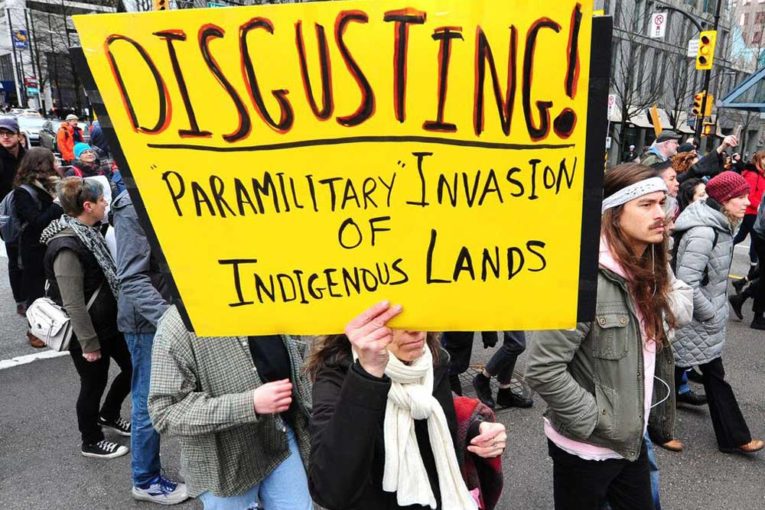
CALGARY – The Supreme Court of British Columbia has ruled that Indigenous law is not necessarily Canadian law in a decision that will enable more construction work on the $6.6-billion Coastal GasLink pipeline despite some First Nations opposition.
B.C. Supreme Court Justice Marguerite Church ruled Tuesday that Coastal GasLink has suffered irreparable harm after protestors built blockades and camps to stop work crews from accessing parts of the natural gas pipeline route between Dawson Creek and Kitimat, B.C., where a massive LNG export terminal is under construction.
Church granted both an interlocutory injunction and an enforcement order, which will “provide a mandate to the RCMP to enforce the terms of the order.”
While Wet’suwet’en customary laws clearly exist on their own independent footing, they are not recognized as being an effectual part of Canadian law
Justice Church
The decision doesn’t spell out what the RCMP can do to enforce the injunction but police have been heavily scrutinized over the past year for enforcing a previous injunction granted by Justice Church against Coastal GasLink protestors.
Last January, RCMP officers enforcing an interim injunction order for Coastal GasLink moved on a blockade, arrested protestors and removed obstacles in what became a nationally televised confrontation.
The case has showcased divisions within some First Nations communities, where elected chiefs and hereditary chiefs sometimes jostle to enforce title rights of parts of traditional territories.
In this case, Coastal GasLink has signed agreements with elected First Nations groups along the pipeline route, but a group of Wet’suwet’en hereditary chiefs have said they oppose the project and tried to use First Nations law to prevent the company from building the pipeline.
In her decision, Justice Church took issue with various First Nations groups and some hereditary chiefs claiming that Indigenous laws give them legal rights to blockade crews trying to access the area.
“They submit that the plaintiff is in their traditional territory in violation of Wet’suwet’en law and authority and their efforts in erecting the Bridge Blockade were to prevent violation of Wet’suwet’en law,” Justice Church wrote.
However, she also noted that Indigenous laws do not become part of Canadian common or domestic law until they are enshrined through treaties, court declarations, statutory provisions or other means.
“There has been no process by which Wet’suwet’en customary laws have been recognized in this manner,” the judge wrote. “While Wet’suwet’en customary laws clearly exist on their own independent footing, they are not recognized as being an effectual part of Canadian law.”
However, the overlap between Canadian law and Indigenous law has not been completely settled and courts across the country have had different opinions on the topic, said Dwight Newman, a law professor at the University of Saskatchewan and the Canada Research Chair in Indigenous Rights and Constitutional Law.
“I think there are some interesting tensions to be sorted out, which is a major issue for Canada in terms of in what ways Indigenous law does or does not become part of Canadian law,” Newman said in an interview.
“In terms of this particular decision, the judge is also saying that there wasn’t very good evidence in terms of what the Indigenous law was,” Newman said, noting the judge found multiple groups claiming rights over tracts of land amid conflicting claims of hereditary lineage.
The group of opposed Wet’suwet’en hereditary chiefs released a statement saying they would reject the Supreme Court decision, which they said has “criminalized” their Indigenous laws.
“We have a responsibility to enforce Wet’suwet’en laws and to ensure the health of our territories for future generations, as we have done for thousands of years,” the statement noted.
Coastal GasLink and some of the opposed hereditary chiefs came to an agreement on a protocol for accessing the area in April 2019, but some protestors have continued to impede work at the site.
Unidentified protestors had previously contravened an interim injunction, Justice Church wrote in her ruling.
In one case, the judge wrote, masked protestors delayed work by “driving a pickup truck into an active work site at a high rate of speed and close to contractors actively working on the road.”
For its part, Coastal GasLink said in a release it will continue to “abide by the terms” of agreements it signed with opposed groups like the Unist’ot’en Camp and “will continue efforts to engage with any affected groups to ensure public safety while our field crews continue to progress their crucial activities.”
• Email:
You can read more of the news on source
